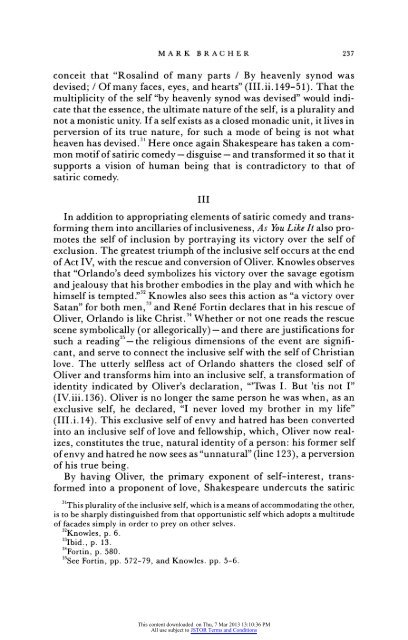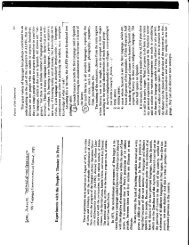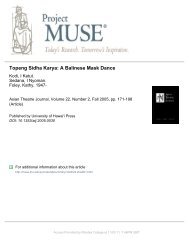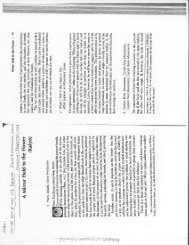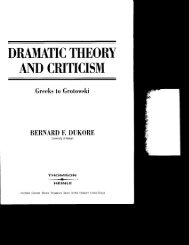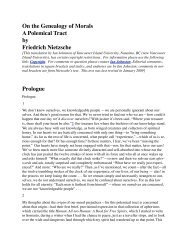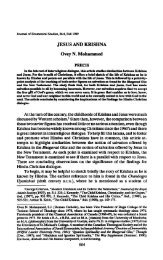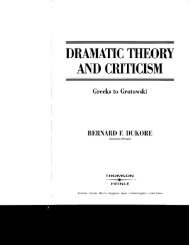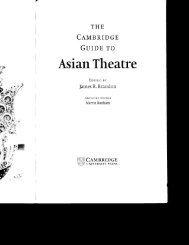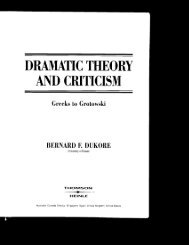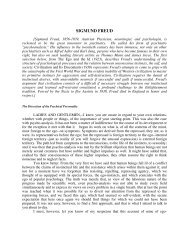Contrary Notions of Identity in As You like It - Yavanika
Contrary Notions of Identity in As You like It - Yavanika
Contrary Notions of Identity in As You like It - Yavanika
You also want an ePaper? Increase the reach of your titles
YUMPU automatically turns print PDFs into web optimized ePapers that Google loves.
MARK<br />
BRACHER<br />
237<br />
conceit that "Rosal<strong>in</strong>d <strong>of</strong> many parts / By heavenly synod was<br />
devised; / Of many faces, eyes, and hearts" (III.ii. 149-51). That the<br />
multiplicity <strong>of</strong> the self "by heavenly synod was devised" would <strong>in</strong>dicate<br />
that the essence, the ultimate nature <strong>of</strong> the self, is a plurality and<br />
not a monistic unity. If a self exists as a closed monadic unit, it lives <strong>in</strong><br />
perversion <strong>of</strong> its true nature, for such a mode <strong>of</strong> be<strong>in</strong>g is not what<br />
heaven has devised.31 Here once aga<strong>in</strong> Shakespeare has taken a common<br />
motif <strong>of</strong> satiric comedy-disguise-and transformed it so that it<br />
supports a vision <strong>of</strong> human be<strong>in</strong>g that is contradictory to that <strong>of</strong><br />
satiric comedy.<br />
III<br />
In addition to appropriat<strong>in</strong>g elements <strong>of</strong> satiric comedy and transform<strong>in</strong>g<br />
them <strong>in</strong>to ancillaries <strong>of</strong><strong>in</strong>clusiveness, <strong>As</strong> <strong>You</strong> Like <strong>It</strong> also promotes<br />
the self <strong>of</strong> <strong>in</strong>clusion by portray<strong>in</strong>g its victory over the self <strong>of</strong><br />
exclusion. The greatest triumph <strong>of</strong> the <strong>in</strong>clusive self occurs at the end<br />
<strong>of</strong> Act IV, with the rescue and conversion <strong>of</strong> Oliver. Knowles observes<br />
that "Orlando's deed symbolizes his victory over the savage egotism<br />
and jealousy that his brother embodies <strong>in</strong> the play and with which he<br />
himself is tempted."32 Knowles also sees this action as "a victory over<br />
Satan" for both men,33 and Rene Fort<strong>in</strong> declares that <strong>in</strong> his rescue <strong>of</strong><br />
Oliver, Orlando is <strong>like</strong> Christ.34 Whether or not one reads the rescue<br />
scene symbolically (or allegorically) - and there are justifications for<br />
such a read<strong>in</strong>g35-the religious dimensions <strong>of</strong> the event are significant,<br />
and serve to connect the <strong>in</strong>clusive self with the self <strong>of</strong> Christian<br />
love. The utterly selfless act <strong>of</strong> Orlando shatters the closed self <strong>of</strong><br />
Oliver and transforms him <strong>in</strong>to an <strong>in</strong>clusive self, a transformation <strong>of</strong><br />
identity <strong>in</strong>dicated by Oliver's declaration, "'Twas I. But 'tis not I"<br />
(IV.iii.136). Oliver is no longer the same person he was when, as an<br />
exclusive self, he declared, "I never loved my brother <strong>in</strong> my life"<br />
(III.i. 14). This exclusive self <strong>of</strong> envy and hatred has been converted<br />
<strong>in</strong>to an <strong>in</strong>clusive self <strong>of</strong> love and fellowship, which, Oliver now realizes,<br />
constitutes the true, natural identity <strong>of</strong> a person: his former self<br />
<strong>of</strong> envy and hatred he now sees as "unnatural" (l<strong>in</strong>e 123), a perversion<br />
<strong>of</strong> his true be<strong>in</strong>g.<br />
By hav<strong>in</strong>g Oliver, the primary exponent <strong>of</strong> self-<strong>in</strong>terest, transformed<br />
<strong>in</strong>to a proponent <strong>of</strong> love, Shakespeare undercuts the satiric<br />
3This plurality <strong>of</strong> the <strong>in</strong>clusive self, which is a means <strong>of</strong> accommodat<strong>in</strong>g the other,<br />
is to be sharply dist<strong>in</strong>guished from that opportunistic self which adopts a multitude<br />
<strong>of</strong> facades simply <strong>in</strong> order to prey on other selves.<br />
32Knowles, p. 6.<br />
3Ibid., p. 13.<br />
34Fort<strong>in</strong>, p. 580.<br />
35See Fort<strong>in</strong>, pp. 572-79, and Knowles. pp. 5-6.<br />
This content downloaded on Thu, 7 Mar 2013 13:10:36 PM<br />
All use subject to JSTOR Terms and Conditions


